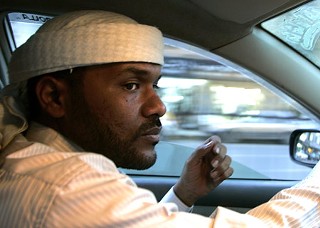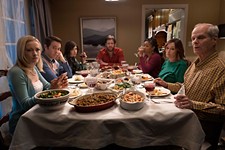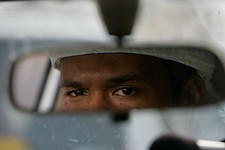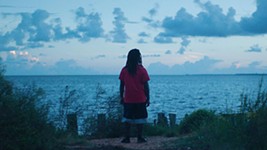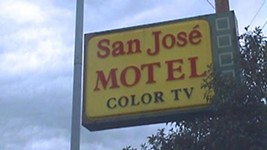Two Brothers, Two Paths
AFS Documentary Tour: 'The Oath'
By Anne S. Lewis, Fri., June 4, 2010
Filmmaker Laura Poitras prefers to talk about large foreign policy issues through the stories of individuals. Her first film, the Academy Award-nominated My Country, My Country (2006), opened a window on the Iraqi elections of 2005 as told through the story of a Sunni doctor running for election to the Baghdad Provincial Council. For her latest film, The Oath, Poitras originally had in mind a film about Guantánamo, possibly following the homecoming of a released prisoner. That took her to Yemen, the home of many Guantánamo Bay detainees, including the one we're probably most familiar with, Salim Hamdan, the Osama bin Laden hired-hand driver who was seized in Pakistan after 9/11 and whose trial, seven years later, by a Bush-era military tribunal, was overturned by the Supreme Court as a violation of international law. Hamdan was still incarcerated at Guantánamo (he was subsequently released in 2009) when Poitras was taken to meet his family at their home in Sanaa, the Yemen capital. It was there that she found the subject of her film, Abu Jandal (a nom de guerre meaning "death"), Hamdan's brother-in-law. He had once been bin Laden's bodyguard in Afghanistan, and, as the "Emir of Hospitality," as he was known, ran guesthouses for new al Qaeda recruits there. In fact, he was the one who recruited Hamdan to Afghanistan; the two men became brothers-in-law when bin Laden ordered them to marry two sisters. He struck Poitras as the perfect vehicle for the story she'd hoped to tell through Hamdan but, lacking access to him, could only be told through his letters or via what others would say about him and through moody sunset and exterior shots of Guantánamo's exterior (for which the film won a cinematography award at Sundance). Jandal, on the other hand, a taxi driver in Sanaa, was a wily, voluble, scenery-chewing talker (who had previously appeared on 60 Minutes and talked to reporters). For Poitras, he was perfect – "someone who intersected with the post-9/11 universe in so many ways."
And that was before she really knew anything about him at all. Turns out, after his stint as bin Laden's bodyguard, Jandal returned to Yemen in 2000 where he was rounded up and put into prison following the USS Cole bombing, which is where he was during 9/11. (Hamdan also came back to Yemen in 2000 but then returned to Afghanistan, where, after 9/11, he was captured by Afghan soldiers who turned him over to the U.S. – hence his Guantánamo ordeal.) After 9/11, Jandal was interrogated (without using so-called "enhanced" techniques) by the FBI in a Yemeni prison. He named names, including that of his brother-in-law, and provided other very useful information about al Qaeda. He was released from prison after taking part in a mandatory Yemeni government-sponsored rehabilitation program for terrorists in which, in exchange for government assistance with such things as employment, he committed to not using the country as a base for extremist operations.
In The Oath, we follow Jandal around on long takes of his daily routine: the taxi-driving gig, at home with his adorable young son, getting him up at 4:30am to make their prayers, the running life-lesson narrative about distrusting America. Jandal meets with a group of young men who are interested in jihad, offering them contradictory advice on how best to spend their lives – sometimes trying to incite them to jihad, at other times telling them not to waste their lives but get one. The takeaway on the extended time we spend shadowing Jandal (whose personality will either grate or ingratiate) seems like a variation on the "banality of evil" idea: that someone formerly (or possibly still) associated with a nihilist group could also be a devoted dad, snacking and watching cartoons with his son and haggling over taxi fares with his customers.
Meanwhile, back at Guantánamo, Poitras intercuts her fly-on-the-wall footage of Jandal's life in Sanaa with the footage shot by cinematographer Kirsten Johnson, along with archival footage of the legal maneuvering then surrounding Hamdan's detention and the voiceover readings of his letters to his family. He's something of a ghost protagonist. Juxtaposing the parallel stories of the two brothers-in-law seems to highlight, though it's not entirely clear, the misfiring of justice that has allowed one man to spend seven years detained, questioned, and then illegally tried at Guantánamo, likely for the "crime" of just being at the wrong place at the wrong time – while the other, an honest-to-goodness mujahid, has a life on the outside.
In the end, Poitras was pleased with the direction The Oath ended up taking. "Themes of family, guilt, betrayal, regret, loyalty, and absence are not typically things that come to mind when we imagine a film about al Qaeda and Guantánamo, so the story compelled me," she says. "It was a way to grapple with the traumatic events of the past nine years on a human level."
Austin Chronicle:What were your biggest challenges (aside from financing) in making the film? And the triumphs?
Laura Poitras: This is definitely the hardest film I've ever worked on. Working in Baghdad was much easier by comparison. The sensitivity of the issues in this film added a level of stress and anxiety that I've never experienced. Everyone who worked on the project took on this intense pressure.
I'm most proud of the fact that the film pushes boundaries – both in terms of its form and the central protagonists. Abu Jandal is revealed to be contradictory and unreliable – he is an antihero. Hamdan is missing. Both are challenging for audiences, but I think we succeed in taking the viewer on a journey with many surprises and full of psychological tension.
AC: When you're in Yemen, researching or shooting your film, do you feel safe? I assume you're not traveling by yourself?
LP: I was living alone in Yemen (I do my own camera/sound). I rented a house in the old city of Sanaa. Nasser Arrabyee, a local journalist, was my co-producer, and he arranged the meetings with Abu Jandal, so he often accompanied me. I was there back and forth for two years, so I would shop, take taxis, and meet friends. I had a much more normal life than in Baghdad, which was much more dangerous. I can't say I felt safe. I was making a film about al Qaeda, so naturally I worried about things like kidnapping.
AC:Do you speak Arabic? If not, were there pitfalls of dealing with an interpreter?Have you had any problems relying on translations?
LP: There are different dialects of Arabic. I don't speak the language. I often filmed and got the translation afterward. When I did interviews, of course I worked with a translator, but mostly the film is shot vérité following events unfolding (not interviews), so in those scenes I don't work with a translator. I film and find out later about the dialogue.
AC: By cutting back and forth between the parallel stories/situations of the two brothers-in-law, what point were you trying to make? And, by focusing so closely on Jandal and his family and his job, what do you want us to understand about him?
LP: I don't make films to have a single "takeaway." I want the work to reflect the complexities of issues, so I guess that the takeaway is that we need a more complex understanding of the issues to make the right decisions. With both My Country, My Country and The Oath, I try to take big issues and understand them through individuals.
With The Oath, I think the film provides insight into many issues, including: Torture is not necessary to obtain information; the military commission process is fundamentally flawed; there is a new generation of al Qaeda being radicalized by the U.S. response to 9/11; that there are internal debates within al Qaeda and understanding those divisions might be a key to stop the further radicalization of the next generation; marriage and family is a deradicalizing force, for example.
AC:Having filmed in both Iraq and Yemen, do you think that we in the U.S. have an accurate grasp of the politics there?
LP: No, of course I don't think the U.S. has an accurate grasp. We took a containable threat and transformed it into a social movement by the occupation of Iraq, Abu Ghraib photos, Guantánamo Bay Prison, et cetera.
AFS Documentary Tour presents The Oath June 9, 7pm, at the Alamo Drafthouse at the Ritz (320 E. Sixth). Tickets are $4 for AFS members and $6 for the general public. For more info, see www.austinfilm.org.





